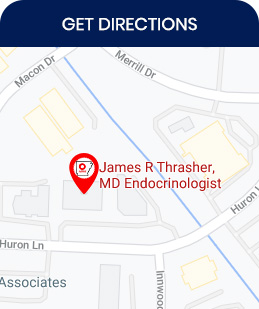What Does an Endocrinologist Do on the First Visit?
Our endocrinologist and medical staff at Arkansas Diabetes and Endocrinology Center are pleased to offer you professional services. For more information, contact our office to schedule an appointment. We serve patients from Little Rock, AR and surrounding areas.


Table of Contents:
What is the most common cause of endocrine disorders?
How do you get referred to an endocrinologist?
What does an endocrinologist do on the first visit?
Why do diabetics see an endocrinologist?
Endocrine glands produce and release hormones that control many important body functions, including how the body converts calories into energy to power cells and organs. It influences how your heart beats, how your bones and tissues grow, and even how you can have a baby. Diabetes, thyroid disease, growth disorders, sexual dysfunction, and a host of other hormone-related disorders are all affected by your hormone levels.
There are two main categories of endocrine disorders. A hormone imbalance occurs when a gland produces too much or too little of an endocrine hormone. Lesions that develop in the endocrine system (such as nodules or tumors) can cause endocrine disease that may or may not affect hormone levels.
A feedback system in the endocrine system controls the balance of hormones in the bloodstream. The feedback system signals the correct gland or glands if you have too much or too little of a certain hormone. Hormone imbalances can occur if your feedback system cannot keep hormone levels in balance, or if your body does not fully remove them from the bloodstream.
Increased or decreased levels of endocrine hormone may be caused by a disease, a problem with the endocrine feedback system, a tumor of an endocrine gland, an injury to an endocrine gland, or an infection. It may also result from a failure of one gland to stimulate another to produce hormones (the hypothalamus, for example, can cause pituitary hormone production to be disrupted).
Genetic disorders, such as multiple endocrine neoplasia (MEN) or congenital hypothyroidism, can also cause this condition. The majority of endocrine tumors and nodules (lumps) are noncancerous. In most cases, they do not spread to other parts of the body. The gland’s hormone production may be interfered with by a tumor or nodule.
Endocrinologists are typically seen in outpatient settings after being referred by your primary care physician. If an underlying hormone-related disorder is suspected during an inpatient visit, an endocrinologist could be consulted.
There are a variety of reasons why patients see endocrinologists, including diabetes management, thyroid problems, cancer, adrenal disorders, and more. Your doctor will likely refer you when there are concerns about diabetes, thyroid disorder, osteoporosis, polycystic ovary syndrome, low testosterone, or endocrine gland cancer.
At your first appointment, your endocrinologist will ask about your symptoms, medications, health habits, and family history of hormone-related problems. Your medical records will be reviewed, and your referring doctor will be consulted.
The endocrinologist will also check your pulse, heart rate, and blood pressure during the physical exam. They will examine your skin, hair, mouth, and teeth as hormone-related disorders can affect these areas. Additionally, they may order blood work or urinalysis, order a biopsy, or order imaging tests such as computed tomography or magnetic resonance imaging.
Your endocrinologist will work with your referring doctor to develop a treatment plan once a diagnosis has been made. For chronic hormone-related conditions, some people will continue to see an endocrinologist.
Diabetics see an endocrinologist because they are highly specialized in the management of the condition. They work with patients to develop a diabetes management plan that works best for them. Diabetes can be managed long-term with a self-care plan created with the guidance of your healthcare provider. It is possible to live a long, healthy life with diabetes if you take care of yourself every day.
Typical management plans include regular visits to your healthcare provider to monitor blood glucose levels and other health indicators. Additionally, your practitioner or care team may suggest a nutritional plan to help you control your blood sugar, blood pressure, and cholesterol levels.
Treatment from an endocrinologist is available at Arkansas Diabetes and Endocrinology Center.
For more information, contact our office to schedule an appointment. We serve patients from Little Rock AR, Conway AR, North Little Rock AR, Pine Bluff AR, Hot Springs AR, Benton AR, Sherwood AR, Russellville AR, Jacksonville AR, Cabot AR, Searcy AR, Bryant AR, Jonesboro AR, Forrest City AR, Magnolia AR, Camden AR, Malvern AR, Batesville AR, Arkadelphia AR, Clarksville AR, Monticello AR, Heber Springs AR, Morrilton AR, Stuttgart AR, Greenbrier AR, Sheridan AR, and Vilonia AR.







